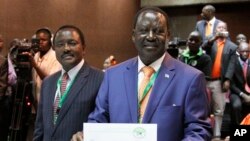Kenyan Prime Minister Raila Odinga is making his third, and possibly final, bid for the office of president.
In 2007, he ran against outgoing President Mwai Kibaki, losing in a controversial election. His supporters accused Kibaki of rigging the results, sparking a spate of violence which left more than 1,100 dead.
This time, his challenger is Deputy Prime Minister Uhuru Kenyatta. Like Kenyatta, who is the son of Kenya's first president, Odinga was seemingly born into politics. His father, Jaramogi Oginga Odinga, was Kenya's first vice president in 1963.
Raila Odinga began his career as an activist lobbying for political reforms during the 1980s.
In 1982, he was accused of plotting a coup against then president Daniel arap Moi and sentenced to seven months of house arrest. He was later charged with treason and went on to spend six years in detention without charge.
Odinga went into exile in Norway in the early 1990s, returning several years later to resume political work.
He made his first attempt for president during the 1997 election, coming in third after Arap Moi and outgoing President Mwai Kibaki.
He went on to serve as minister of energy from 2001 to 2002 and as minister of roads, public works, and housing from 2003 to 2005.
After the disputed 2007 election, he became prime minister in a coalition government, as part of a power-sharing deal to end the bloodshed. He and Kibaki are both credited with helping to push forward a new constitution as well as improving the Kenyan economy.
In 2007, he ran against outgoing President Mwai Kibaki, losing in a controversial election. His supporters accused Kibaki of rigging the results, sparking a spate of violence which left more than 1,100 dead.
This time, his challenger is Deputy Prime Minister Uhuru Kenyatta. Like Kenyatta, who is the son of Kenya's first president, Odinga was seemingly born into politics. His father, Jaramogi Oginga Odinga, was Kenya's first vice president in 1963.
Raila Odinga began his career as an activist lobbying for political reforms during the 1980s.
In 1982, he was accused of plotting a coup against then president Daniel arap Moi and sentenced to seven months of house arrest. He was later charged with treason and went on to spend six years in detention without charge.
Odinga went into exile in Norway in the early 1990s, returning several years later to resume political work.
He made his first attempt for president during the 1997 election, coming in third after Arap Moi and outgoing President Mwai Kibaki.
He went on to serve as minister of energy from 2001 to 2002 and as minister of roads, public works, and housing from 2003 to 2005.
After the disputed 2007 election, he became prime minister in a coalition government, as part of a power-sharing deal to end the bloodshed. He and Kibaki are both credited with helping to push forward a new constitution as well as improving the Kenyan economy.
Some information for this report was provided by AFP.





